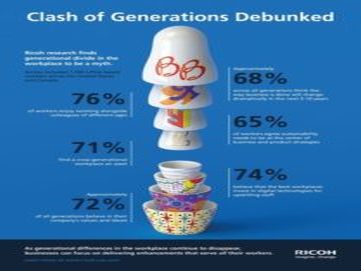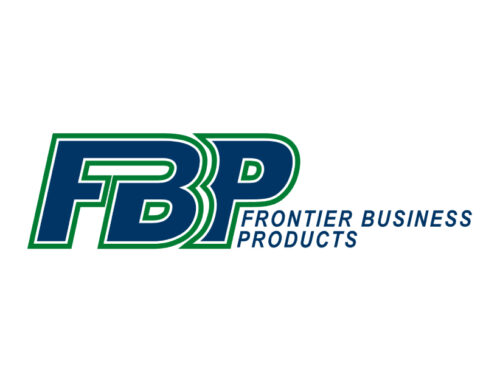Ricoh USA, Inc. unveiled the findings of new research that shows the reality of multi-generational relationships to be more collaborative than past perceptions of conflict. According to new Ricoh research commissioned by them, 1 which included 1,500 respondents across the United States and Canada, 71% find a cross-generational workplace an asset to a company and 76% of those same workers enjoy working alongside colleagues of different ages. Additionally, the generational divide in the workplace is more united than ever in its demand for a seismic change in the way we all conduct business in the future. It’s no longer enough to measure just financial success, with employees from across the generations calling on businesses to be a force for good and drive positive change in the world.
The reason? The line between our personal and professional worlds is blurring as technology frees us from the traditional 9-5 office set up. The choice of our profession and how we decide to work is increasingly becoming a defining factor of who we are as individuals. This is driving employees of all ages to recognize each other’s strengths and weaknesses. For instance, more than three out of five respondents believe that a four-day work week will be more likely due to Generation Z’s use of technology to be more efficient.
“Today’s workforce is unique, as was the workforce 20 years ago, and 20 years before that,” said Donna Venable, Executive Vice President, Human Resources and Deputy General Manager, Shared Services, Ricoh Americas. “The truth is today’s current workforce, which consists of more generations than ever before, is unified. We’re seeing a greater understanding that no action is too small to contribute to the bigger picture and therefore a realization that the collective impact businesses can have will be significant to helping ensure a better future for generations to come. In a time of often unpleasant news, this unification is a positive statement.”
Other findings include:
- An average of 72% across all generations believe in their company’s values and ideals
- Employees are personally invested in their workplaces, with an average of 59% across all generations viewing their work as a key factor in defining who they are as a person
- An average of 68% across all generations think the way the world does business will change dramatically in the next five to 10 years
- 65% of workers agree sustainability needs to be at the center of business and product strategies in the next five to 10 years
Employees also believe the role of a responsible employer should include upskilling a digital workforce and innovating in their sectors. Workers see new technologies as vital in driving this change, with 66% agreeing technology should play a central role in helping them work to the best of their abilities. Meanwhile, 74% believe that the best workplaces invest in digital technologies for upskilling staff.
Venable adds: “It’s not just the younger generations who want businesses to act. We’re seeing all age groups coming together with a collective demand to incorporate more sustainable and responsible working practices, something we hold in great regard at Ricoh. This involves operating in harmony with the environment, demonstrating respect for your people as well as the wider societies in which a business operates. At Ricoh, we’re doing this by embracing and taking action to support the UN Sustainable Development Goals, including a commitment to reducing our CO2 emissions to zero by 2050. As business leaders, we have a duty to listen to our workforce and we’re hearing them loud and clear when it comes to the bigger picture.”
Find out more at www.ricoh-usa.com/multigenworkplace.
1 This report is based on a survey of 1,500 office-based employees across North America. The survey was conducted by Coleman Parkes and commissioned by Ricoh.
2 For reference, generations were defined by year of birth as below:
- Baby Boomers: 1946 – 1964
- Generation X: 1965 – 1980
- Generation Y: 1981 – 1995
- Generation Z: 1996 – Today



